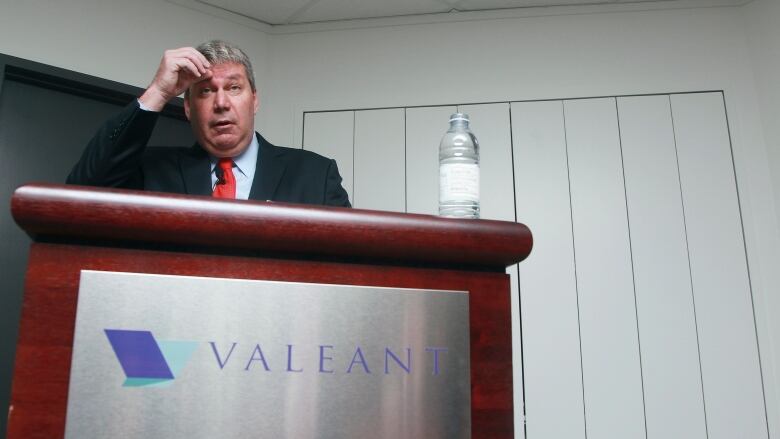Philidor to close up shop as Valeant cuts ties with specialty pharmacy

Valeant Pharmaceuticals, a company that has come under intense scrutiny for its drug prices, has cut ties with Philidor following accusations that it was a "phantom pharmacy" used solely to artificially boost sales.
Valeant said Friday that the mail-order pharmacy has informed the company that it will shut down as soon as possible.
- Valeant shares plunge after fraud allegation from short-seller Citron
- Valeant subpoenaed in U.S. court over drug pricing
The imminent end of Philidor comes just hours after the nation's two largest pharmacy benefit providers, CVS Health and Express Scripts, said that they had ended all interactions with the company citing its business practices. UnitedHealth Group conducted an audit of Philidor in late 2014 and began cutting ties with the company "in the interests of our customers."
Valeant Pharmaceuticals International Inc. is under fire for its practice of buying smaller drug developers and then hiking prices on the medicines developed by that company. At the same time, the company's profits have skyrocketed as it slashed spending on research into new drugs.
Valeant had become a Wall Street favorite and its shares hit an all-time high as recently as August, but it has been hammered relentlessly since coming under a national spotlight.
Share prices have plunged almost 60 percent in the past three months, wiping away billions in market capitalization.
The gloom didn't end on Friday, as Valeant shares lost another 16 per cent on the TSX to close at $93.77. Two months ago, the shares were worth more than three times that, and Valeant was the biggest publicly traded company in Canada.
Federal prosecutors have subpoenaed documents tied to Valeant's drug pricing and other practices ahead of a presidential election in which the soaring price of prescription medicines has become a top political issue.
'Loss of confidence'
Valeant Chairman and CEO J. Michael Pearson said Friday that the latest allegations prompted a loss of confidence in Philidor's operations.
"We know the allegations have also led them to question Valeant and our integrity, and for that I take complete responsibility," Pearson said. "Operating honestly and ethically is our first priority, and you have my absolute commitment that we will make it right."
The company said it plans to fill any prescription lapses at its own expense to ensure patients' access to drugs as Philidor shuts down.
Last week, short seller researcher firm Citron accused Valeant of using Philidor to create a network of "phantom pharmacies" to steer pharmacy benefit managers toward Valeant's more expensive drugs, instead of lower-priced alternatives.
Valeant announced this week that it was forming special board committee to take a closer look Philidor, including why the company was denied a permit last year to operate in California. The state's pharmacy board cited, among other reasons, false statements about Philidor's ownership and operations. A week prior, Valeant disclosed a $100 million investment in Philidor, with an option to buy the pharmacy.
On Friday, Valeant appointed former U.S. Deputy Attorney General Mark Filip to advise the committee looking Philidor.
Ire over rising drug prices has only intensified in the latter half of this year.
A poll released Wednesday by the nonpartisan Kaiser Family Foundation showed that 77 percent of those surveyed said the cost of prescription drugs is their primary health concern. For years doctors and insurers have condemned the runaway cost of prescription drugs.
Democratic presidential campaign candidates Hillary Clinton and Bernie Sanders have made unaffordable drugs a campaign issue and outlined reforms designed to keep drugmakers in check.
Pharmaceuticals under the microscope
The public found its own villain last month in the CEO of Turing Pharmaceuticals, Martin Shkreli.
Shkreli's company obtained rights to sell Daraprim, the only U.S.-approved treatment for a deadly parasitic infection called toxoplasmosis.
Shkreli, a former hedge fund manager, promptly raised the price of Daraprim, which had cost $13.50 for years, by 5,000 percent.
After coming under withering fire Shkreli vowed to lower the price, but there is no evidence that he has done so.
Valeant, Laval, Quebec, came under scrutiny for a similar tactics after it bought the life-saving heart drugs Nitropress and Isuprel in February and almost immediately increased their prices, tripling one and raising the other sixfold. Valeant has maintained that it has done nothing wrong.
Last month, members of the House Committee on Oversight and Government Reform sent a letter to Chairman Jason Chaffetz, R-Utah, asking him to issue a subpoena to Valeant Pharmaceuticals and to invite the Canadian company to testify before Congress.
Shares of Valeant, which had fallen 5 percent in midday trading, doubled those losses after Citron, the short seller, said it would deliver more potentially damaging news Monday.
With files from CBC News












_(720p).jpg)


 OFFICIAL HD MUSIC VIDEO.jpg)
.jpg)



























































































